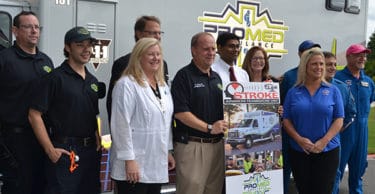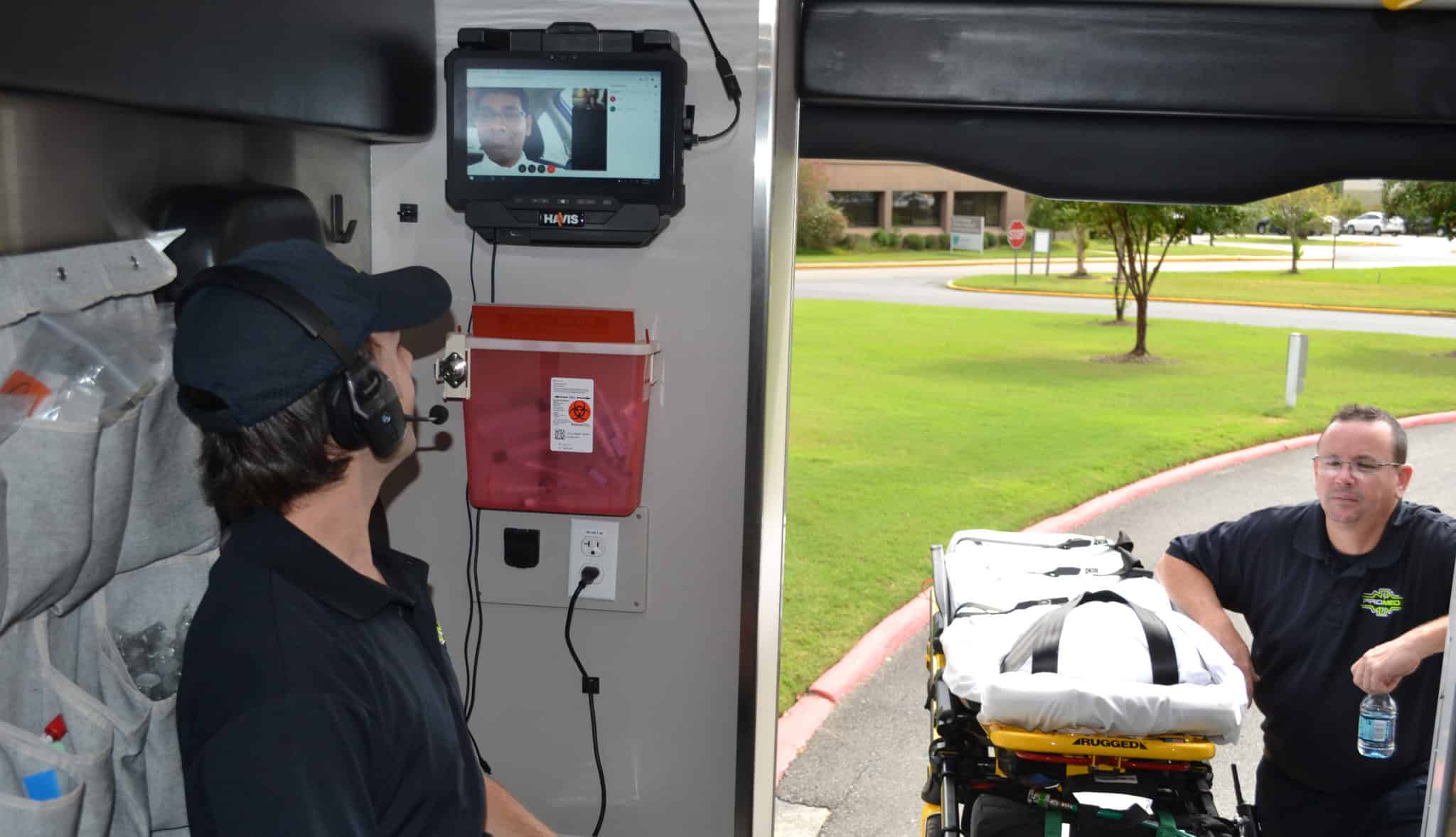Ambulance to Provide Stroke Care Through Telemedicine in Pilot Study by AR SAVES, Health Department, ProMed
| To provide faster stroke care, an emergency medical services stroke telemedicine pilot study was recently established by the University of Arkansas for Medical Sciences (UAMS)-led AR SAVES program, the Arkansas Department of Health and ProMed Ambulance Service in El Dorado. As part of the pilot study, telemedicine equipment has been installed in a ProMed Advanced Life Support (ALS) Ambulance to provide a live, mobile video consult with a stroke neurologist.

Personnel and staff from AR SAVES, ProMed and Medical Center of South Arkansas gather for a photo next to the ProMed ambulance that will be used in a telemedicine pilot study.
The AR SAVES (Arkansas Stroke Assistance through Virtual Emergency Support) program is a partnership between the UAMS Center for Distance Health, the state Department of Human Services and 55 participating hospitals, including Medical Center of South Arkansas in El Dorado, Magnolia Regional Medical Center, Ouachita County Medical Center in Camden and Ashley County Medical Center in Crossett.
The pilot program will study the effectiveness of telemedicine in an ambulance in decreasing the treatment time for stroke patients arriving at area hospitals via ambulance through better identification in the field and enhanced pre-notification to receiving hospitals.

Sanjeeva Onteddu, M.D., left, talks with State Sen. Trent Garner and Ken Kelley, ProMed Ambulance Service CEO, about the AR SAVES program.
The telemedicine equipment’s electronic, wireless connections have been tested in various areas of the region and are working well. Protocols and training with paramedics to perform a modified stroke assessment have been implemented. Mock drills with the AR SAVES Call Center and training sessions with the staff at area hospitals also have been completed.
“We want all the communities served by ProMed to know that EMS Stroke Telemedicine is available in their town and to call 911 and specify that they or someone they know are having stroke symptoms,” said UAMS’ Sanjeeva Reddy Onteddu, M.D., AR SAVES medical director. “That will ensure that the telemedicine ambulance is dispatched.”
The AR SAVES program uses a high-speed video communications system that links vascular neurologists to rural emergency departments statewide to provide immediate, life-saving treatments to stroke patients 24 hours a day. One of the stroke neurologists evaluates whether emergency room physicians should use a powerful blood-clot dissolving agent within the critical three-hour period following the first signs of stroke.

Nich Miller, ProMed paramedic, talks with Onteddu via a live video connection in a ProMed Ambulance.
“ProMed is excited to take part in this pilot study with all the partners involved, especially because of what it enables us to offer to the people of Union County and the areas around it — a stronger hope of survival and recovery from stroke,” said Ken Kelley, ProMed CEO.
Only 1 percent of stroke patients living in rural Arkansas received stroke care before 2008 when the AR SAVES Program began. Today, more than 34 percent receive care. Nearly 70 percent of AR SAVES patients treated have completely recovered or recovered with slightly impaired function.
“This partnership gives us an opportunity to enhance the high level of quality care that residents in our region can find close to home here at Medical Center of South Arkansas in El Dorado,” said Scott Street, the hospital’s CEO. “We’re committed to helping reduce the number of deaths and disabilities in Arkansas caused by stroke each year and to being a vital part of this important pilot study.”
